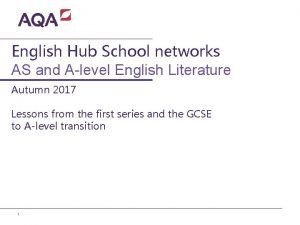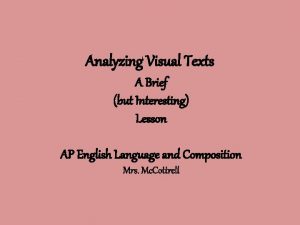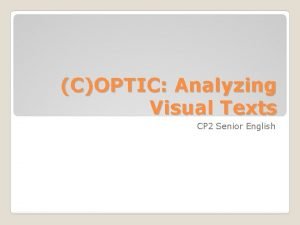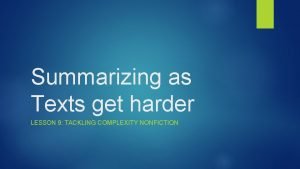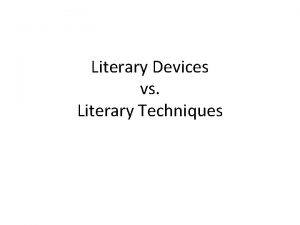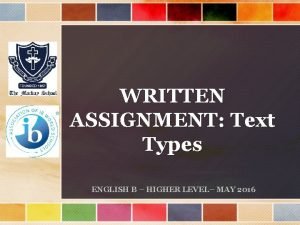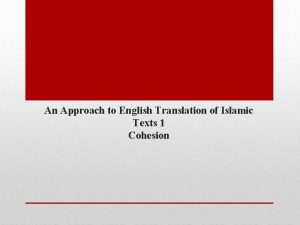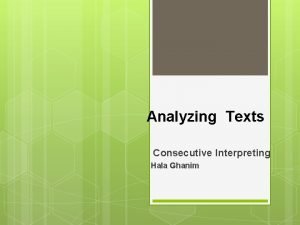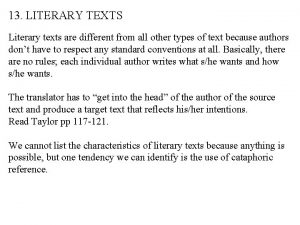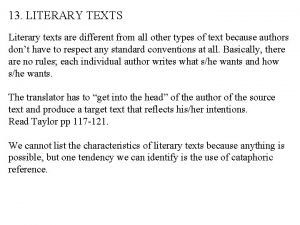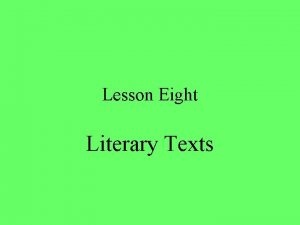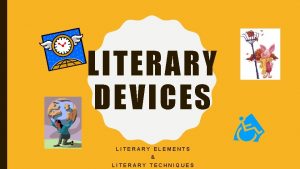ANALYZING LITERARY TEXTS English 1302AP English Literature Literary







- Slides: 7

ANALYZING LITERARY TEXTS English 1302/AP English Literature

Literary Analysis: The Concept Analyzing a literary text does not require a different approach than one uses when responding to a visual or nonfiction argument. Literary analysis is simply an individual interpretation of meaning (which may go to author’s purpose and often does in a traditional approach) The key skills are � Close reading � Attention to detail � Adequate support of assertion (textual evidence)

https: //www. goshen. edu/academic s/english/literary-analysis-guide/ Offer a thesis or topic sentence indicating a basic observation or assertion about the text or passage. Offer a context for the passage without offering too much summary. Cite the passage (using correct format). Then follow the passage with some combination of the following elements: � � Discuss what happens in the passage and why it is significant to the work as a whole. Consider what is said, particularly subtleties of the imagery and the ideas expressed. Assess how it is said, considering how the word choice, the ordering of ideas, sentence structure, etc. , contribute to the meaning of the passage. Explain what it means, tying your analysis of the passage back to the significance of the text as a whole. Repeat the process of context, quotation and analysis with additional support for your thesis or topic sentence.

Today’s assignment Several passages have been selected from Frankenstein. You will each receive a copy of those passages before we begin rotations. You will have 15 minutes to look over the passages and make any notes you wish to make. ***yes, you may write on the handout. After 15 minutes, you will then engage in a discussion (20 -25 minutes) with your group members regarding the passages. Jot down additional observations.

Focus should be on. . . Character (development, transformation, etc) Theme ***everything goes back to theme Symbols/motifs/other devices/diction choices Point of view (pay attention to any changes in POV) Plot/structure Reactions (personal, but phrased using an academic voice) Culture/background/history (of the characters, literary movement) Compare/contrast (of characters, idea, etc. ) Issues of morality/ethics ***popular approach to literary analysis ***these are the standard questions/elements of literary analysis.

Now, we want to develop an analytical response to the passages from Frankenstein. Each group will be assigned one passage. Together, you will develop a paragraph-length analysis of the text (6 -8) sentences. You will have 20 minutes to discuss and develop your collective response. All responses will be used for class review/discussion.

Structure Start with an observation about the passage. (not plot!). Connect that observation to theme. Develop the paragraph with commentary about the passage, including textual evidence. Make sure you cite it (Shelley 45). ***use at least two quotes in your paragraph. When quoting, be sure to embed quotes. Also, it’s better to use shorter passages (no more than 8 words). End the paragraph by making a judgement about the meaning of the work. What is the lasting impact?
